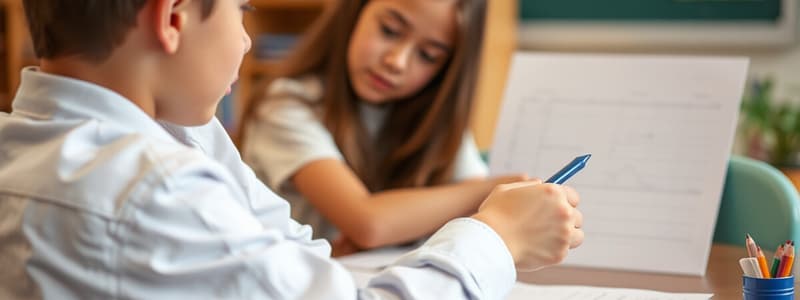Podcast
Questions and Answers
What is the primary focus of Classical Test Theory (CTT)?
What is the primary focus of Classical Test Theory (CTT)?
- Comparing different testing frameworks in classroom assessments
- Evaluating the practical applications of assessment
- Analyzing external conditions impacting test performance
- Measuring the frequency of correct responses to indicate difficulty and reliability (correct)
Which of the following is NOT a characteristic of a good and effective test?
Which of the following is NOT a characteristic of a good and effective test?
- Unpredictable difficulty level (correct)
- High validity
- Consistent item-total correlation
- Reliable scoring patterns
What does grading primarily involve in the context of student assessment?
What does grading primarily involve in the context of student assessment?
- Assigning value to a learner's performance based on established criteria (correct)
- Summarizing descriptive statistics of all learners
- Comparing students' scores across different subjects
- Determining the overall school performance metrics
Which of the following statements about descriptive statistics is true?
Which of the following statements about descriptive statistics is true?
What is the significance of acceptable psychometric properties in a test?
What is the significance of acceptable psychometric properties in a test?
Which framework is focused on how variations in examinee performance are influenced under constant conditions?
Which framework is focused on how variations in examinee performance are influenced under constant conditions?
Which of the following can also serve as a basis for grading learners, besides tests?
Which of the following can also serve as a basis for grading learners, besides tests?
How does a test demonstrate discrimination between higher and lower-performing learners?
How does a test demonstrate discrimination between higher and lower-performing learners?
What is the primary purpose of assessment in learning?
What is the primary purpose of assessment in learning?
How can assessment impact the educational process?
How can assessment impact the educational process?
Evaluation in the context of assessment is best described as:
Evaluation in the context of assessment is best described as:
Which of the following is not a characteristic feature of measurement?
Which of the following is not a characteristic feature of measurement?
When can assessment take place in the teaching and learning process?
When can assessment take place in the teaching and learning process?
What does assessment aim to achieve in relation to student learning?
What does assessment aim to achieve in relation to student learning?
In educational assessment, what is the relationship between measurement and evaluation?
In educational assessment, what is the relationship between measurement and evaluation?
Which statement accurately reflects a broad understanding of assessment?
Which statement accurately reflects a broad understanding of assessment?
What is a key characteristic of the most authentic assessments?
What is a key characteristic of the most authentic assessments?
What must assessment tools possess to be considered valid?
What must assessment tools possess to be considered valid?
How should assessment be conducted to effectively evaluate student learning?
How should assessment be conducted to effectively evaluate student learning?
What is the importance of reformulating objectives based on assessment results?
What is the importance of reformulating objectives based on assessment results?
Why is it necessary to have challenging tasks in assessments?
Why is it necessary to have challenging tasks in assessments?
What is a holistic approach to assessment?
What is a holistic approach to assessment?
What role does assessment play in teacher planning?
What role does assessment play in teacher planning?
Why should assessments give equal importance to process and product?
Why should assessments give equal importance to process and product?
What is the primary purpose of assessment results in education?
What is the primary purpose of assessment results in education?
Which of the following best describes the role of counseling in assessment?
Which of the following best describes the role of counseling in assessment?
How are assessment results used in accountability within educational programs?
How are assessment results used in accountability within educational programs?
What type of students are selected to be placed in the honor roll based on assessment results?
What type of students are selected to be placed in the honor roll based on assessment results?
Which factor is NOT commonly assessed in counseling to aid student improvement?
Which factor is NOT commonly assessed in counseling to aid student improvement?
What happens if the majority of students do not master a lesson according to assessment results?
What happens if the majority of students do not master a lesson according to assessment results?
What is a key reason for assessing vocational interests among students?
What is a key reason for assessing vocational interests among students?
Who is held accountable for the implementation of educational programs based on assessment results?
Who is held accountable for the implementation of educational programs based on assessment results?
What is the primary function of assessment in the educational context?
What is the primary function of assessment in the educational context?
Which of the following describes the concept of authenticity in assessment?
Which of the following describes the concept of authenticity in assessment?
How can a teacher use assessment results effectively?
How can a teacher use assessment results effectively?
What does a low appraisal or negative feedback indicate about a student's performance?
What does a low appraisal or negative feedback indicate about a student's performance?
What role do grades play in the educational assessment process?
What role do grades play in the educational assessment process?
Who are the stakeholders that might be influenced by the reported grades of students?
Who are the stakeholders that might be influenced by the reported grades of students?
What is an example of an assessment task that is considered to have low authenticity?
What is an example of an assessment task that is considered to have low authenticity?
What can be inferred if a student is assessed to be easily distracted in the classroom?
What can be inferred if a student is assessed to be easily distracted in the classroom?
Flashcards are hidden until you start studying
Study Notes
Assessment in Learning
- Assessment is the process of gathering quantitative and qualitative data to make informed decisions regarding education.
- It is crucial for evaluating the impact of curriculum and instruction on student learning.
- Without assessment, educators cannot gauge student progress and adapt teaching methods effectively.
Importance of Assessment
- Assessment is integrated throughout the educational process, occurring before, during, and after instruction.
- It identifies whether instructional objectives are met, allowing for adjustments in teaching strategies and objectives.
- Comprehensive assessment approaches consider both learning products and processes.
Evaluation
- Evaluation is making value judgments based on collected measurement data, determining the effectiveness and quality of educational practices.
- Standards are applied in evaluation to assess the worth of educational programs, policies, and student performance.
Measurement Frameworks
- Classical Test Theory (CTT) focuses on how variations in test performance relate to examinee abilities, while controlling for external and internal factors that affect testing.
- Item Response Theory emphasizes the significance of item-level response patterns to analyze test effectiveness.
Grading in Assessment
- Grading assigns value to student performance based on defined criteria and encompasses various classroom tasks beyond traditional tests.
- It reflects a learner’s achievement of educational goals and can shape future instructional planning.
Authentic Assessment
- Authentic assessments closely mirror real-world tasks, enhancing the relevance and applicability of student learning experiences.
- Tasks can range from least to most authentic, with a higher authenticity leading to more meaningful learning outcomes.
Uses of Assessment
- Appraisal: Provides feedback on individual performance, indicating areas for improvement based on grades and ratings.
- Planning: Guides instructional adjustments based on assessment data for maximizing student learning effectiveness.
- Accountability: Holds educators and programs responsible for delivering educational quality and improving practices based on assessment results.
- Counseling: Utilizes various assessment results to support student emotional and academic development.
Descriptive Statistics in Assessment
- Descriptive statistics help interpret test results, including performance trends and errors in understanding material, aiding teachers in refining assessments.
Essential Properties of a Good Test
- Good tests must be valid, reliable, of appropriate difficulty, and capable of distinguishing between varying ability levels among students.
- Educators are tasked with developing assessments that reflect these properties for effective evaluation of student learning.
Studying That Suits You
Use AI to generate personalized quizzes and flashcards to suit your learning preferences.




